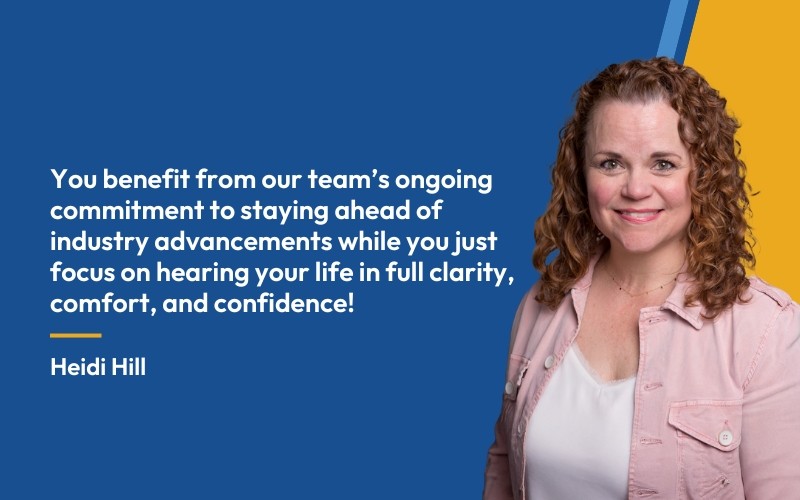Published on
Aug 11, 2025
|
2 min read
With nearly three decades of experience, I have worked hard to establish myself as a trusted leader in my field, as well as a compassionate advocate for individuals experiencing hidden hearing challenges.
I was recently featured on Brain Wellness, the Podcast, where I had the chance to discuss the pivotal role the auditory system plays in concussion recovery – a link often overlooked in traditional medical narratives.
The Brain-Hearing Connection
Understanding hearing as merely an "ear issue" gives low credit to its true complexity; the auditory process is a sophisticated neurological event where sound waves are transformed into electrical signals interpreted by the brain.
When concussions occur, this intricate system is frequently interrupted, affecting sound clarity, processing speed, and cognitive load. These changes can manifest as difficulties in noisy environments, slower speech comprehension, and increased listening fatigue.
For many, these symptoms are frustratingly persistent and can significantly hamper day-to-day activities and recovery efforts.
Hidden Hearing Loss Explained
Hidden hearing loss is a condition affecting millions of Americans, yet it remains elusive to standard hearing tests.
Characterized by an individual's difficulty in understanding speech amid background noise, this condition may also include symptoms like tinnitus, hyperacusis (sound sensitivity), and cognitive strain during auditory tasks.
Following a concussion, the brain's auditory pathways can suffer damage, further exacerbating these issues even when ear functions appear normal in typical evaluations.
Overlooked auditory symptoms can prolong recovery times and lead to unnecessary frustration. Hidden hearing loss and its associated auditory processing alterations may persist for years without targeted intervention.
It’s crucial to understand and address these challenges early on for better concussion management and a more streamlined healing process.
Innovative Testing & Treatment
Innovative assessments such as the frequency following response test (FFR) are revolutionizing how we address concussion-related auditory challenges.
This objective, research-backed evaluation measures how effectively the brain tracks and processes sounds, revealing deficits that conventional tests might overlook. Our clinic leverages this advanced diagnostic tool to tailor care plans that address the unique needs of each patient.
With expert care, you are offered a comprehensive suite of auditory processing evaluations and proven therapeutic solutions for tinnitus, such as sound therapy combined with counseling, which have been instrumental in reducing distress and improving patient focus.
In cases of sound sensitivity, bespoke treatments, including hyperacusis therapy, are available to support individuals in regaining comfort with everyday sounds after concussions.
Hearing aids and auditory training programs also play a crucial role, helping improve sound clarity and reduce the cognitive load associated with listening. Even for those with ears that test normal, these interventions can dramatically enhance daily interactions and quality of life.
Hope & Neuroplasticity
The brain has a characteristic called neuroplasticity – its ability to adapt and rewire in response to targeted interventions. Although early diagnosis is beneficial, it’s important to note that even long-standing symptoms can be addressed effectively with personalized care plans.
Timely intervention is crucial in addressing the auditory symptoms associated with concussions. Delaying care can not only prolong symptoms but also complicate the recovery process.
With appropriate guidance and support, the brain can re-establish efficient auditory processing pathways, enhancing overall cognitive functions and patient well-being. Individualized training programs like ours aim to facilitate such adaptations, offering renewed hope to those affected.
Take Control with Expert Help
Concussions and their aftermath should not overshadow the prospects for a healthy, active life.
If you or your loved ones are grappling with unresolved hearing or sound processing challenges post-concussion, it's essential to seek expert evaluation and care.
Ready to get started? Request a callback to get in touch with our team, or give us a call at (763) 657-0675.

Dr. Heidi Hill, Au.D
Heidi Hill, Au.D. is an audiologist and Cognihear expert providing hearing aids, hearing tests, specializing in concussions, tinnitus, and auditory processing issues for patients located in Osseo, MN.
Popular Blogs

2min Read
How Hearing Aids Made Listening Easier and Less Exhausting: Kathryn’s Story
By Dr, Heidi Hill

2min Read
How Hearing Aids Helped a Musician Stay Connected and Engaged: Wade’s Story
By Dr, Heidi Hill

2min Read
Hearing Aids and Heart: One Nurse’s Path to Better Hearing
By Dr, Heidi Hill

2min Read
How You Can Benefit From AI-Powered Hearing Aids: Expert Insights From Dr. Heidi Hill
By Dr, Heidi Hill

